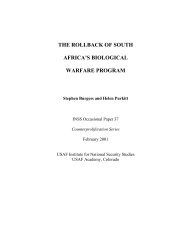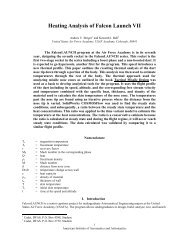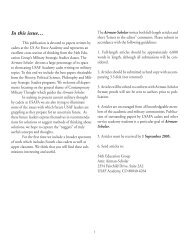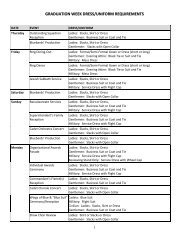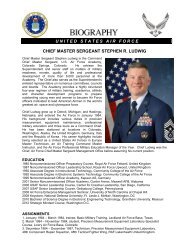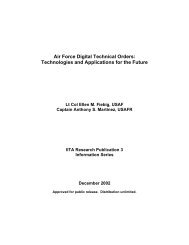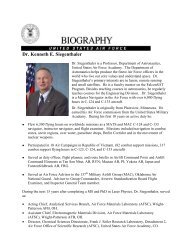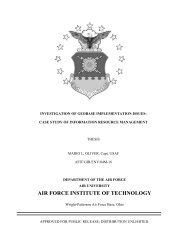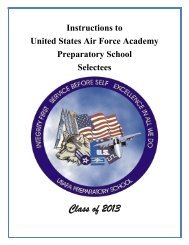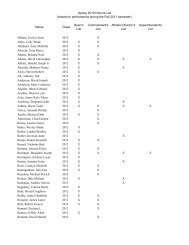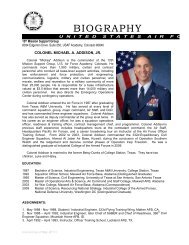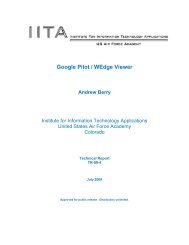Military Professionalism - United States Air Force Academy
Military Professionalism - United States Air Force Academy
Military Professionalism - United States Air Force Academy
You also want an ePaper? Increase the reach of your titles
YUMPU automatically turns print PDFs into web optimized ePapers that Google loves.
Snider, Don M. Dissent and Strategic Leadership of the <strong>Military</strong> Professions. Carlisle<br />
Barracks: U.S. Army War College, Strategic Studies Institute, Feb. 2008.<br />
http://handle.dtic.mil/100.2/ADA477064<br />
“The professional ethic of the Army in the modern era has held that, in civil-military<br />
relations, the military is the servant of its Constitutionally-mandated civilian leaders, both<br />
those in the Executive branch and in the Congress. As Samuel Huntington noted,<br />
“loyalty and obedience” are the cardinal military virtues. This precept has remained<br />
embedded in the Army’s professional ethos to this day, especially for the strategic leaders<br />
of the Army Profession. An act of public dissent is to be exceptionally rare, undertaken<br />
only after the most careful analysis and determination of its absolute necessity.”<br />
Sondheimer, Rachel Milstein, Isaiah Wilson III, Thomas Greco, Kevin Toner, and<br />
Cameron West. “Ideological Perceptions and Civil-<strong>Military</strong> Relations.” In<br />
Attitudes Aren’t Free: Thinking Deeply about Diversity in the U.S. Armed <strong>Force</strong>s.<br />
Ed. James E. Parco and David A. Levy. Maxwell <strong>Air</strong> <strong>Force</strong> Base, Alabama: <strong>Air</strong><br />
University Press, Feb. 2010, 423-436.<br />
http://handle.dtic.mil/100.2/ADA518901<br />
Civilian control of the military is rooted in America’s traditional distrust of standing<br />
armies. The U.S. military identifies itself as an apolitical entity. DOD policy makers<br />
must be aware of the potential moral hazard in the gap of perceived ideological leanings<br />
within civilian and military spheres and how it may affect the perception of military<br />
advice in the policy arena. It is also vital that the DOD be proactive in this debate and<br />
continue to put forth scholarship and sponsor data collection in both military and civilian<br />
spheres to understand and counter the consequences of this potential moral hazard, which<br />
threatens to undermine the role of the military as key provider of defense expertise on<br />
policy matters.<br />
Starry, Donn A. “In Pursuit of an Ethic.” Army (Sept. 1981): 11-13.<br />
The military needs a clear ethic that reflects the fundamental values of the nation and<br />
satisfies the unique needs of the professional soldier. This set of values must include<br />
loyalty to the institution, loyalty to the unit, personal responsibility, selfless service,<br />
competence, commitment, candor, and courage.<br />
Starry, Donn A. “The Profession of Arms in America.” from Encyclopedia of the<br />
American <strong>Military</strong> Vol. I. Ed. John E. Jessup and Louise B. Ketz. New York, NY:<br />
Charles Scribner’s Sons, 1994: 467-470.<br />
The basic function of the military is to be prepared to fight the nation’s wars and, if<br />
necessary, to conduct military operations in order to achieve political goals set forth by<br />
24




